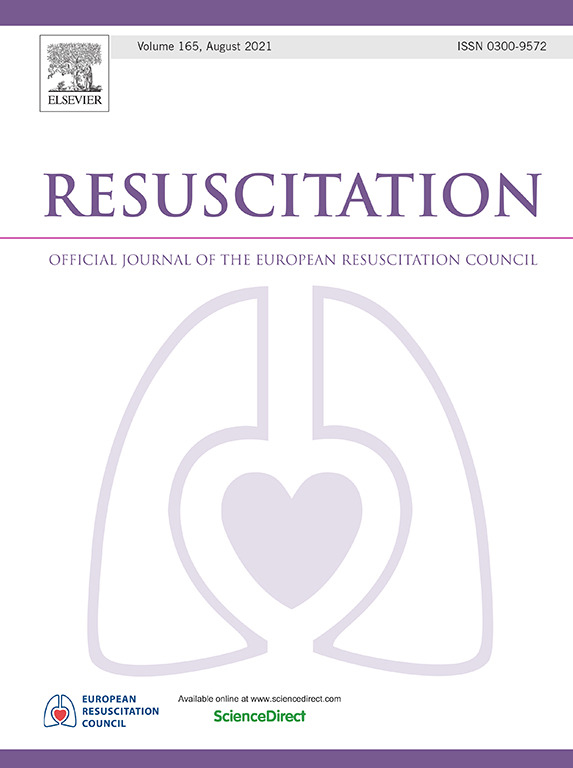与非心脏病患儿相比,心脏病患儿心脏骤停的结果和处理趋势:来自美国心脏协会《Get With The Guidelines®-复苏注册》的分析报告
IF 6.5
1区 医学
Q1 CRITICAL CARE MEDICINE
引用次数: 0
摘要
在过去 20 年中,儿科院内心肺复苏事件后的当代存活率和存活趋势尚未根据疾病类别进行比较。我们假设,外科心脏病患者出院后的存活率要高于非心脏病患者,而且所有类别的患者在院内心肺复苏后的存活率都会随着时间的推移而增加。本文章由计算机程序翻译,如有差异,请以英文原文为准。
Trends in cardiac arrest outcomes & management in children with cardiac illness category compared to non-cardiac illness category: An analysis from the AHA Get With The Guidelines®-Resuscitation Registry
Introduction
Contemporary rates of survival after pediatric in-hospital CPR events and trends in survival over the last 20 years have not been compared based on illness category. We hypothesized that survival to hospital discharge for surgical-cardiac category is higher than the non-cardiac category, and rates of survival after in-hospital CPR increased over time in all categories.
Methods
The AHA Get With The Guidelines®-Resuscitation registry was queried for index CPR events in children < 18 years of age from 2000 to 2021. Categories were surgical-cardiac (in-hospital CPR event following cardiac surgery); medical-cardiac (CPR event in non-surgical cardiac disease); and non-cardiac (CPR event in patients without cardiac disease). The primary outcome was survival to hospital discharge. We compared eras 2000–2004, 2005–2009, 2010–2014, and 2015–2021 with mixed logistic regression models, including event year as a continuous predictor and site as a random effect.
Results
Of 16,241 index events, in-hospital CPR event rates by illness category were: 19 % surgical-cardiac, 18 % medical-cardiac, and 63 % non-cardiac. Surgical-cardiac category had the highest rate of survival to hospital discharge compared to medical-cardiac and non-cardiac categories (56 % vs. 44 % vs. 46 %; p < 0.001). After controlling for age, location of event, and hospital size, the odds of survival were highest for surgical-cardiac category (aOR 1.28, 95 % CI 1.17–1.41) and lower for medical-cardiac category (aOR 0.90, 0.82–0.98), compared to the non-cardiac category. Odds of survival increased for all illness categories from the 2000–2004 era to the 2015–2021 era. Rates of improvement differed among illness categories with medical-cardiac having the lowest increased odds per era. Surgical-cardiac patients had the highest rates of extracorporeal resuscitation (ECPR) (20 % across the cohort), though the greatest increase in ECPR utilization was in the non-cardiac population (52 % increased odds per era).
Conclusions
Over the last 20 years, both survival to hospital discharge and ECPR use has increased in all in-hospital CPR event illness categories. Children with surgical-cardiac CPR event have higher odds of survival to hospital discharge compared to non-cardiac CPR event categories, whereas odds of survival were lowest with medical-cardiac CPR events.
求助全文
通过发布文献求助,成功后即可免费获取论文全文。
去求助
来源期刊

Resuscitation
医学-急救医学
CiteScore
12.00
自引率
18.50%
发文量
556
审稿时长
21 days
期刊介绍:
Resuscitation is a monthly international and interdisciplinary medical journal. The papers published deal with the aetiology, pathophysiology and prevention of cardiac arrest, resuscitation training, clinical resuscitation, and experimental resuscitation research, although papers relating to animal studies will be published only if they are of exceptional interest and related directly to clinical cardiopulmonary resuscitation. Papers relating to trauma are published occasionally but the majority of these concern traumatic cardiac arrest.
 求助内容:
求助内容: 应助结果提醒方式:
应助结果提醒方式:


